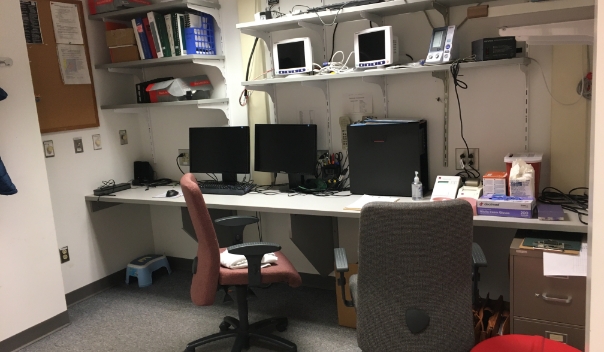News & Updates
The Carolina Blue Project provided health assessment to deputies in Davie County, North CarolinaSeptember 21, 2023
Dr. Grace Wu, School of Nursing, UNC Chapel Hill
The Carolina Blue Project team recently visited Davie County, North Carolina, to provide cardiovascular-related health assessment for 23 law enforcement officers. Davie County, established in 1836 after its separation from Rowan County, derives its name from William R. Davie, who served as North Carolina's Governor from 1798 to 1799. According to the 2020 census, the county boasts a population of 42,712. While predominantly rural in character, Davie County is experiencing a noteworthy increase in its suburban population. This growth can be attributed to the county's exceptional quality of life, affordable living costs, highly-rated educational institutions, a well-regarded community college, advanced medical facilities, all conveniently situated in proximity to neighboring urban centers.
On the 23rd of September 2023, the dedicated Carolina Blue Project team paid a visit to the Davie County Sheriff's Office. Collaborating closely with the highly experienced Davie County Sheriff's Office Training Division, our team engaged with numerous deputies and correction officers. Our primary objective was to offer comprehensive cardiovascular health assessments, contributing to their overall well-being. Beyond the medical aspect, we took the opportunity to listen to their personal narratives, gaining valuable insights into their experiences and challenges within the field of law enforcement.
During our visit, we were impressed by the commitment of the sheriff's office leadership, who clearly demonstrated a genuine concern for the welfare of their law enforcement officers. They underscored the utmost importance of ensuring the physical and mental health of their dedicated personnel, emphasizing the critical role that well-being plays in the demanding profession of law enforcement. This commitment serves as a testament to the Sheriff's Office's dedication to both the safety of the community and the welfare of their dedicated team.
Are you a North Carolina law enforcement officer? Visit our Participation page to learn more about The Carolina Blue Project, or contact us at yakew@email.unc.edu to schedule a visit at your department.
The Carolina Blue Project provided health assessments to police officers in Fayetteville, NCJuly 13, 2023
Katherine Fitzgerald, Undergraduate Research Assistant, Adams School of Dentistry Oral Microbiology, UNC Chapel Hill
The Carolina Blue Project research team from The University of North Carolina at Chapel Hill recently completed an exciting and meaningful journey to Fayetteville, North Carolina, on July 13th to offer health assessment for cardiovascular disease risk of local law enforcement officers.
Fayetteville, nestled along the Cape Fear River, has a metropolitan population of 500,000 people and is most well known for having one of the globe’s largest military bases, Fort Liberty. As we approached the local police station, we were particularly enamored with the lovely and quaint streets, businesses, and parks in the historic district of Fayetteville.
The adventure began when the detective who organized the event warmly guided us into the building and helped set up our stations when we arrived at 9 am. He was very personable and fun-spirited, but what stood out to me was his generosity as I watched him help his colleagues to go through the process for 5 hours (mind you, while on a fast) before allowing himself to join the line.
For the research set up, we divided the tasks between three stations. I was responsible for the informed consent to guide and explain the process to the officers. Watching the friendly dynamics between the officers was fascinating and very fun to witness. Tany, a fellow undergraduate research assistant, measured and documented the non-invasive health measurements of the officers (weight, height, waist size, hip size, blood pressure, and heart rate), which were used in combination with the blood sample taken by Dr. Grace Wu to provide a comprehensive picture of the officers’ health status and identify potential areas for improvement. Tany and Dr. Wu both explained the health assessment results, an experience that Tany thoroughly enjoyed because it felt incredibly impactful. We were able to complete all health assessments, pack up, and leave by 3:30 pm. I enjoyed the car ride back to Chapel Hill as it was an opportunity to get to know my research team more. It also wasn’t too far of a drive!
The Carolina Blue Project research team provided health assessments to 34 law enforcement officers in total, one of the highest numbers of participants, which was exciting to see for my first trip with the Carolina Blue Project. More importantly, this trip reflects the potential positive impact on NC law enforcement officers' well-being. In the bigger picture, hopefully, this research can contribute to a healthier and happier community and foster stronger bonds between officers and the people that they serve.
The Carolina Blue Project visited the North Carolina Department of Adult Correction in Winston-SalemJune 16, 2023
Dr. Grace Wu, School of Nursing, UNC Chapel Hill
The Carolina Blue Project team recently visited the North Carolina Department of Adult Correction in Winston-Salem, North Carolina, to provide cardiovascular-related health assessment for 39 law enforcement officers. Located in Forsyth County, North Carolina, Winston-Salem has a storied past rooted in the tobacco and textile industries, and its historic districts are a testament to its industrial heritage.
The Carolina Blue Project team visited the North Carolina Department of Adult Correction on June 16th, 2023. With the assistance and excellent leadership of the Chief Probation/Parole Officer at the North Carolina Department of Adult Correction, our team provided cardiovascular health assessments for 39 law enforcement officers in Winston-Salem. We saw from the Chief that she cared deeply about the health and well-being of her officers.
Are you a North Carolina law enforcement officer? Visit our Participation page to learn more about The Carolina Blue Project, or contact us at yakew@email.unc.edu to schedule a visit at your department.
The Carolina Blue Project Provided Health Assessments in Onslow CountyMay 22, 2023
Tany Rodriguez, Department of Psychology and Neuroscience, UNC Chapel Hill
The Carolina Blue Project research team embarked on a visit to the Onslow County, where we received a warm welcome from a local Lieutenant who helped to arrange and organize our visit. The Lieutenant graciously guided us to a generously provided, spacious room to ensure a smooth and comfortable process.
To facilitate efficient health assessments, we carefully set up dedicated stations. The first station was focused on informed consent, where Neyeon, the lead research assistant, explained and described the study parameters and the overall process to the participating officers. Next, was my station, where I measured the officers' blood pressure, height, weight, hip, and waist. Finally, Dr. Grace Wu occupied the station where officers received their results, based on both the non-invasive measurements and the blood samples she carefully retrieved from their fingertips.
Despite the exhaustion that awaited us on the journey back, it was an endeavor well worth it. This trip marked our most extensive health assessment to date, holding immense potential to benefit a significant number of local law enforcement officers. We knew that the health assessment we provided would ultimately have a far-reaching impact, positively influencing the lives of numerous law enforcement officers in North Carolina.
The Impact of The Carolina Blue ProjectMay 20, 2023
Tany Rodriguez, Department of Psychology and Neuroscience, UNC Chapel Hill
I serve as a Research Assistant for The Carolina Blue Project. During my time at the Biobehavioral Lab at the University of North Carolina at Chapel Hill, I had the incredible opportunity to be involved in this project—an important study focused on supporting law enforcement officers.

Law enforcement is a high-stress profession, and exposure to high work-related stressors can contribute to various psychological distress, such as post-traumatic stress disorder, anxiety, depression, sleep problems, and unhealthy eating. Officers who suffer from psychological distress are at higher risk of developing cardiovascular diseases and their risk factors, including weight gain, hypertension, and heart attack.
As I became more immersed in The Carolina Blue Project, I was confronted with a disheartening reality. Law enforcement officers in the United States face the highest mortality rate from cardiovascular disease among all occupations. However, what struck me even more was the lack of comprehensive studies addressing the cardiovascular health of law enforcement officers specifically in North Carolina. This knowledge gap served as a clear indication that we needed to dive deeper into the factors contributing to poor health trends among North Carolina's law enforcement community, with the ultimate goal of enhancing their well-being.
The Carolina Blue Project, conducted by Dr. Grace Wu at the University of North Carolina at Chapel Hill, seeks to fill this research gap and understand the unique health challenges faced by North Carolina law enforcement officers. As part of my role in the Project, I was responsible for preparing the equipment for in-person assessments and performing non-invasive data collection at the UNC Biobehavioral Laboratory or local law enforcement departments. This included measuring officers' blood pressure, height, and weight, as well as their waist and hip size. By gathering these measurements, we aimed to obtain valuable data that could contribute to our understanding of the cardiovascular health of law enforcement officers in North Carolina.
Contributing to the Carolina Blue Project has been a deeply rewarding experience. I have witnessed firsthand the dedication and sacrifices made by law enforcement officers, as well as the pressing need to address the cardiovascular health challenges they face. The Carolina Blue Project stands as a testament to our unwavering commitment to the well-being of North Carolina law enforcement officers. Through rigorous research, collaboration, and heartfelt concern for their health, we aim to empower and support these brave individuals who selflessly serve our communities. Our mission is to ensure that they receive the care and attention they deserve, with the ultimate goal of enhancing their health, reducing cardiovascular disease risk factors, and improving their overall quality of life. By shedding light on these issues and offering support, we strive to make a meaningful difference in their lives.
The Carolina Blue Project Received SPLENDOR-NC Pilot GrantMay 26, 2023
Dr. Grace Wu, School of Nursing, UNC Chapel Hill

Congratulations to Dr. Grace Wu, who received the 2023 SPLENDOR-NC pilot grant to support The Carolina Blue Project. This year, Dr. Wu and her research team are traveling to rural areas of North Carolina to provide health assessments to many law enforcement officers. One officer from Stoke County told Dr. Wu, "No research team ever cares about us or comes to our county for research because we are so remote. Your team is the first to make the effort to help us."
SPLENDOR-NC stands for “Supporting, Promoting, and Launching the Expansion of Nutrition, Diabetes, and Obesity Researchers in North Carolina.” The primary objective of SPLENDOR-NC pilot grant is to facilitate the success of diverse faculty engaged in research in the fields of nutrition, obesity, and diabetes at the six participating institutions of SPLENDOR-NC: Duke University, North Carolina A&T State University, North Carolina, Central University, The University of North Carolina at Chapel Hill, Wake Forest University, and Winston-Salem State University. SPLENDOR-NC draws upon well-established collaborations through the NIDDK-funded UNC Nutrition Obesity Research Center and North Carolina Diabetes Research Center.
Visit splendor-nc.org to learn more about the SPLENDOR-NC.
The Carolina Blue Project Provided Health Assessments in Onslow CountyMay 22, 2023
Tany Rodriguez, Department of Psychology and Neuroscience, UNC Chapel Hill
The Carolina Blue Project research team embarked on a visit to the Onslow County, where we received a warm welcome from a local Lieutenant who helped to arrange and organize our visit. The Lieutenant graciously guided us to a generously provided, spacious room to ensure a smooth and comfortable process.
To facilitate efficient health assessments, we carefully set up dedicated stations. The first station was focused on informed consent, where Neyeon, the lead research assistant, explained and described the study parameters and the overall process to the participating officers. Next, was my station, where I measured the officers' blood pressure, height, weight, hip, and waist. Finally, Dr. Grace Wu occupied the station where officers received their results, based on both the non-invasive measurements and the blood samples she carefully retrieved from their fingertips.
Despite the exhaustion that awaited us on the journey back, it was an endeavor well worth it. This trip marked our most extensive health assessment to date, holding immense potential to benefit a significant number of local law enforcement officers. We knew that the health assessment we provided would ultimately have a far-reaching impact, positively influencing the lives of numerous law enforcement officers in North Carolina.
The Impact of The Carolina Blue ProjectMay 20, 2023
Tany Rodriguez, Department of Psychology and Neuroscience, UNC Chapel Hill
I serve as a Research Assistant for The Carolina Blue Project. During my time at the Biobehavioral Lab at the University of North Carolina at Chapel Hill, I had the incredible opportunity to be involved in this project—an important study focused on supporting law enforcement officers.

Law enforcement is a high-stress profession, and exposure to high work-related stressors can contribute to various psychological distress, such as post-traumatic stress disorder, anxiety, depression, sleep problems, and unhealthy eating. Officers who suffer from psychological distress are at higher risk of developing cardiovascular diseases and their risk factors, including weight gain, hypertension, and heart attack.
As I became more immersed in The Carolina Blue Project, I was confronted with a disheartening reality. Law enforcement officers in the United States face the highest mortality rate from cardiovascular disease among all occupations. However, what struck me even more was the lack of comprehensive studies addressing the cardiovascular health of law enforcement officers specifically in North Carolina. This knowledge gap served as a clear indication that we needed to dive deeper into the factors contributing to poor health trends among North Carolina's law enforcement community, with the ultimate goal of enhancing their well-being.
The Carolina Blue Project, conducted by Dr. Grace Wu at the University of North Carolina at Chapel Hill, seeks to fill this research gap and understand the unique health challenges faced by North Carolina law enforcement officers. As part of my role in the Project, I was responsible for preparing the equipment for in-person assessments and performing non-invasive data collection at the UNC Biobehavioral Laboratory or local law enforcement departments. This included measuring officers' blood pressure, height, and weight, as well as their waist and hip size. By gathering these measurements, we aimed to obtain valuable data that could contribute to our understanding of the cardiovascular health of law enforcement officers in North Carolina.
Contributing to the Carolina Blue Project has been a deeply rewarding experience. I have witnessed firsthand the dedication and sacrifices made by law enforcement officers, as well as the pressing need to address the cardiovascular health challenges they face. The Carolina Blue Project stands as a testament to our unwavering commitment to the well-being of North Carolina law enforcement officers. Through rigorous research, collaboration, and heartfelt concern for their health, we aim to empower and support these brave individuals who selflessly serve our communities. Our mission is to ensure that they receive the care and attention they deserve, with the ultimate goal of enhancing their health, reducing cardiovascular disease risk factors, and improving their overall quality of life. By shedding light on these issues and offering support, we strive to make a meaningful difference in their lives.
The Carolina Blue Project Will Schedule Group Assessment Days

The University of North Carolina at Chapel Hill Institutional Review Board officially approved the Carolina Blue Project on February 1, 2023 (IRB # 22-2052). The Carolina Blue Project team currently are working with two North Carolina Police Departments to schedule “group assessment days” for the departments. A “group assessment day” means that the Police Departments choose a day that works for their officers who want to participate in the Carolina Blue Project and invite the Carolina Blue Project team coming into the departments to complete the in-person assessments for a group of officers. Please contact Dr. Grace Wu at yakew@email.unc.edu if you or anyone you know is interested in scheduling a group assessment day for officers to participate in the Carolina Blue Project. All officers who complete both the online survey and in-person assessment will receive a $100 e-gift card.
The Carolina Blue Project has been activated on the UNC's research website

The Carolina Blue Project has been activated on the UNC’s research website, “Research for Me.” Research for Me is a public website that documents all UNC research projects and connects the public with research opportunities at UNC-Chapel Hill, UNC Health, and across North Carolina. You can learn more about our project on Research for Me.